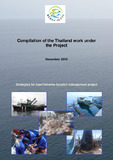| dc.contributor.author | Sinanun, Piyachoke | |
| dc.contributor.author | Sinanun, Thiwarat | |
| dc.date.accessioned | 2020-04-08T07:23:38Z | |
| dc.date.available | 2020-04-08T07:23:38Z | |
| dc.date.issued | 2016-12 | |
| dc.identifier.citation | Sinanun, P., Sinanun, T., & Marine Fisheries Research and Development Division. (2016). Compilation of the Thailand work under the Project. Strategies for trawl fisheries Bycatch management project, 92. | en |
| dc.identifier.uri | http://hdl.handle.net/20.500.12067/1156 | |
| dc.description | This report synthesizes the main outcome of nine technical papers produced in Thailand under the regional REBYC-II CTI project in 2012-2015. The topics of these reports included investigations on the status of marine fisheries resources, quantity and composition of trawl bycatches, fish larvae distributions, regulation of trawl fisheries, experiments on trawl codend selectivity, and socio-economic studies. The work in Thailand was conducted in pilot sites in Trat and Prachuap Khiri Khan-Chumphon Provinces.
In the past three decades, various studies of the demersal and invertebrate resources in the Gulf of Thailand (GoT) indicated over-exploitation of fisheries resources. Catch composition has changed from big sized and high value species to smaller and less value species. In 2013 the total marine capture from all types of gear in Thai waters was 1,614,536 tonnes. The catch from trawlers in 2013 accounted to 513,325 tonnes which was 24.29 % of total catch from GoT. The MSY calculation indicates that the present overall fishing effort is greater than the optimum level by 32.8%, and it should therefore be managed. The experiments using the 4 cm trawl codend mesh size showed that it helped saving many juvenile fishes from getting caught. Though there was some short-term economic loss to fishers using the nets, the long term benefits of the saved resources was realized. Three year project was done to find the effective information i.e. status of fisheries resources, socio-economic of fishers, fish larvae distribution, enlarging trawl cod-end mesh size and Thai Laws in Relation to Trawl Fisheries. The research projects were done in collaboration of stakeholders to achieve the acceptance of the result. The outcome of the research was used to support decision making by both governors and primary stakeholders. The project also helped disseminate the details of various national fisheries management measures especially those under the latest Royal Ordinance on Fisheries B.E.2558 (2015).
The main conclusion of the project activities in Thailand was that appropriate and research-based seasonal and area closures for trawl fishing and codend mesh size enlargement of trawl gear are effective measures to reduce trash fish in trawl catches. One of the lessons learned in the project is that to encourage the key stakeholders to understand and consider the scientific evidence, they should be provided with adequate information of the status of fisheries resources and socio-economic impacts of the planned management measures. This can be effectively done through stakeholder consultation meetings. Such meetings will build trust and acceptance, and will thereby strengthen the fisheries management planning.
One of the key outcomes of the project is that the potential biological and socio-economic effects of management measures should be investigated and considered carefully in close collaboration with key stakeholders. Local knowledge should be included to improve the acceptance and to strengthen the planning. That will increase the confidence in decision making processes. Management measures should be periodically reviewed to ensure that they continue to meet the expected goals and objectives. Clearly defined monitoring and evaluation procedures, as well as a set of indicators, are required to benchmark the sustainability of fisheries management.
Capacity development for fisheries officers and other key stakeholders on fishery governance and social interactions was one of the key factors for the successful preparation of fisheries management plans.
The project recommends that the Department of Fisheries (DoF) disseminates the lessons learned to other areas in Thailand that have similar type of critical problem on trawl bycatch and trash fish. Furthermore, the project acknowledges that widely published information about the status of fisheries resources and fisheries as well as fisheries management plan increases the awareness and acceptance by stakeholders. | en |
| dc.language.iso | en | en |
| dc.publisher | Training Department, Southeast Asian Fisheries Development Center, REBYC-II | en |
| dc.subject | Trawl Fisheries | en |
| dc.subject | bycatch | en |
| dc.subject | management | en |
| dc.subject | REBYC-II CTI | en |
| dc.title | Compilation of The Thailand Work Under The Projectม Strategies for Trawl Fisheries Bycatch Management Project | en |
| dc.type | Working Paper | en |
| dc.contributor.corporateauthor | Marine Fisheries Research and Development Division Department of Fisheries | en |
| dc.contributor.corporateauthor | REBYC-II | en |

